

Leading global change









MENTAL HEALTH:
A DEFINING ISSUE OF OUR TIME
The global mental health crisis is one of the defining issues of our time.
Across the world, an estimated 1 billion people are living with a mental health condition. Many face stigma, discrimination and even criminalisation.
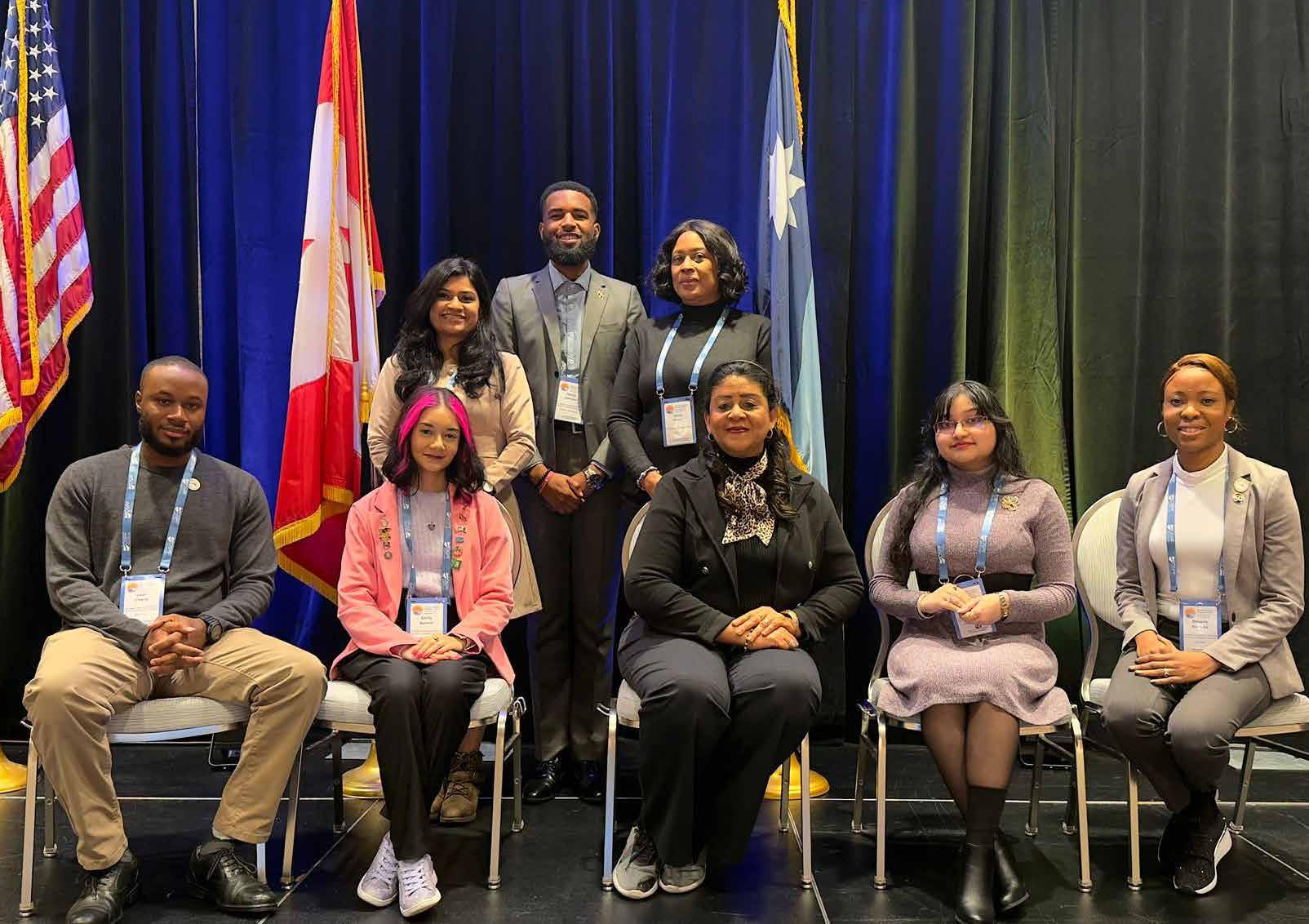
A shortage of skilled mental health staff means the people who need support often cannot get it. While a belief that mental health is separate from – and secondary to – physical health means opportunities to create a more holistic and effective global health system are missed.
At the same time, in 2024, escalating conflict, worsening climate change and economic turmoil increased the pressure on people’s wellbeing. And it’s children and young people – the generation our future depends on – who are being particularly hard hit.
It is time for the world to wake up to the scale and impact of this crisis – and then make the changes we all need.
Step-by-step, United for Global Mental Health is working to build a world where everyone, everywhere, has someone to turn to when they need support with their mental health. In 2024 – alongside partners from government, business, international institutions and civil society – we focused our efforts on five key issues.
We aimed to:
make sure mental health is fully integrated into policies and actions to tackle the climate crisis and environmental destruction
accelerate progress on suicide decriminalisation, particularly in the Caribbean region, where it is treated as a punishable offence rather than a public health issue
make sure mental health care is fully integrated into HIV and TB health services
drive mental health up the political agenda
elevate young people’s mental health up the local, regional and global political agenda
build the field of mental health advocacy through our Global Mental Health Action Network (GMHAN), a worldwide community of advocates that make change happen.
This review gives just a snapshot of some of the successes we achieved together in 2024 in each of these six priority areas.

UnitedGMH’s Aastha Sethi with members of the Caribbean Regional Coalition for Suicide Decriminalisation
DIMENSIONS OF A GLOBAL CRISIS
THE NEED TO DO MORE FOR YOUNG PEOPLE
1 in 5 young people have a mental health condition
THE NEED FOR MORE RESOURCES
50% of mental health conditions start under the age of 14
1 billion people are living with a mental health condition – that’s 1 person in 8 people die by suicide every day
2,000 2,000 2,000 2,000 2,000 2,000
16 18 19 20
Mental health workers account for only 1% of the global health workforce
45% of the world’s population live in a country with fewer than one psychiatrist per 100,000 people 1%
PSYCHOLOGICAL IMPACT OF CLIMATE CHANGE
3.3 to 3.6 billion people are highly vulnerable to climate change – close to half the total global population (IPCC)
US$47billion per year is the social cost of climate change, including the cost of mental health problems linked to air pollution and lack of access to green spaces

PRIORITY 1:
CLIMATE, THE ENVIRONMENT AND MENTAL HEALTH
We are living through an era of biodiversity loss and accelerating climate change. Now, evidence of the impact of that ecological crisis on mental health is starting to emerge – it is pushing up rates of anxiety, depression, stress and trauma.

THE BIG NUMBERS: CLIMATE CHANGE AND THE THREAT TO MENTAL HEALTH
3.3 to 3.6 billion people are highly vulnerable to climate change – close to half the total global population
US$47billion per year by 2030 is the additional societal cost of mental disorders due to changes in climate-related hazards, air pollution and inadequate access to green space
3% – the proportion of countries’ national climate plans (Nationally Determined Contributions) that mention mental health
PUTTING MENTAL HEALTH ON THE GLOBAL CLIMATE AGENDA
As the world seeks to rise to the challenge of the environmental crisis, it is vital that addressing mental health is recognised as part of the solution. That’s why, in 2024, we successfully worked to make sure mental health was high up the global climate agenda.
Part of major global commitments
We contributed to mental health being explicitly included for the first time ever in major global agreements and commitments on climate change and the environment that cover the globe, including:
the 2024 World Health Assembly resolution on climate change and health
the Global Plan of Action on Biodiversity and Health launched at the 16th Conference of the Parties to the Convention on Biological Diversity (CBD COP16)
These agreements are now important precedents that can help make the case for mental health’s inclusion in future climate change and environmental policies at regional, national and global level.
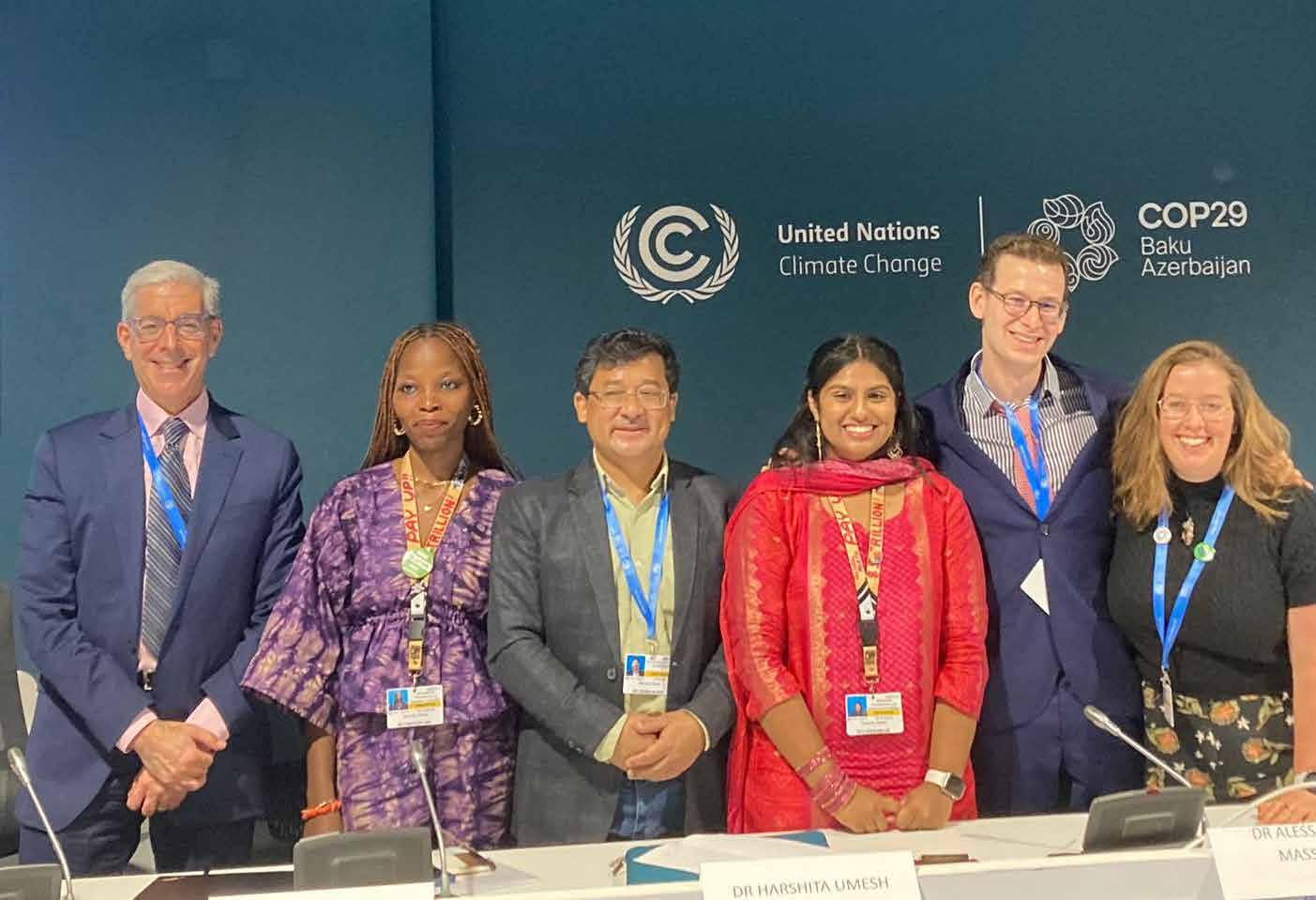
UnitedGMH’s Alessandro Massazza at COP29

, in Baku, Azerbaijan, we raised the profile of mental health by:

co-hosting a side event on children’s mental health
contributing to the inclusion of mental health in the World Health Organisation’s COP29 , which will ensure mental health is a routine part
effectively communicating the need to emphasise mental health in climate discussion via powerful case studies, articles in academic journals and media interviews.
Ahead of COP29, we collected case studies from northern Azerbaijan. They highlighted how increasingly frequent and extreme drought and floods are having an impact on people’s psychological wellbeing.



One local farmer highlighted how:
“[The drought] affects both our income and it affects you personally. We have no other source of income. You end up sleep-deprived. You keep thinking about what will happen and how it will happen. It affects people whether they like it or not. Of course, it affects me. You end up sleepless, you spend sleepless nights.”



UnitedGMH’s Alessandro Massazza and the Honourable Minister of State for Environment of the Federal Republic of Nigeria, Dr Iziaq Adekunle Salako

Front of mind with policymakers


We briefed senior policymakers on the links between climate change and mental health, from securing a meeting with Nigeria’s Minister of State for Environment to giving a keynote address at an EU Presidency High-Level Dialogue on the triple planetary crisis and mental health. We also helped make sure mental health was included on the formal agenda of an expert dialogue on children at the UN Climate Change Conference in Bonn in June 2024 – using these key negotiations to raise awareness about the impacts of climate change on children’s mental health.
In the lead-up to COP30 in Brazil, we will build on this momentum to ensure mental health becomes a national-level and international priority in plans to respond to climate and environmental threats.

“This intersection between climate change and mental health is very important and doesn’t get as much attention. It’s important that we put more emphasis and more attention on the effects of climate change on mental health.”
Honourable Minister of State for Environment of the Federal Republic of Nigeria, Dr Iziaq Adekunle Salako




PRIORITY 2:
THE DECRIMINALISATION OF SUICIDE IN THE CARIBBEAN
Suicide is the most extreme manifestation of our global mental health crisis. More than 700,000 people die by suicide every year, according to the World Health Organisation (WHO).

One step we could take to help reduce suicide is to decriminalise it in every country in the world. Making suicide a criminal offence adds to the stigma surrounding mental ill health and deters people from seeking the support they need. And yet, suicide is still illegal in at least 24 countries.

720,000 people die by suicide every
A Caribbean Coalition for Change
In 2023, we achieved some huge breakthroughs in our campaign to decriminalise suicide. Pakistan, Ghana, Guyana and Malaysia all revoked legislation making suicide illegal. These countries can now prioritise providing support for people with mental ill health rather than punishing them – benefitting over 400 million people.
In 2024, we focused on the only four countries in the Americas, all based in the Caribbean, that still criminalise suicide: Trinidad & Tobago, Grenada, St Lucia and the Bahamas.
Building on what we learned in 2023, in July 2024 we brought together civil society organisations from across the Caribbean to launch the ‘Caribbean Regional Coalition for Decriminalisation of Suicide’. The coalition includes a range of CSOs such as Caricope Wellness Grenada, Mindwise Trinidad & Tobago, the Bahamas Red Cross Society, St Lucia Crisis Centre and Let’s Unpack it Barbados, and is supported by UNICEF, the UN Development Programme and the Pan American Health Organisation (PAHO).
24 countries – where suicide is still illegal

The coalition has:
engaged with policymakers across the region to push for suicide decriminalisation
developed a regional advocacy strategy on how to change the law
gained endorsements and support from the PAHO and the UN
secured dedicated funding for its work in all four countries from USAID
hosted an event to build support for the decriminalisation of suicide in the region at the International Association for Suicide Prevention’s Pan-American Conference.
The coalition is now working in each country to host a high-level meeting with policymakers in early 2025 to present the case to decriminalise suicide in each country. The aim is to secure decriminalisation in as many countries as possible by the end of 2025.





“This coalition signifies a great first step in moving the Caribbean towards addressing suicide through a public health lens.”
Desarie Nicholas, Co-Chair of the Caribbean Regional Coalition for the Decriminalisation of Suicide, Grenada


World Suicide Prevention Day
To mark World Suicide Prevention Day in September 2024, we worked with TrustLaw, Thomson Reuters Foundation’s global pro bono legal programme. With them we launched an updated version of our 2021 report, Decriminalising Suicide: Reducing Stigma, Saving Lives.
The report featured a survey of 23 countries where suicide remains a criminal offence,



with details of existing legislation, its current impact, efforts to change it (if any), and other pathways to change. It also featured contributions from key partners, including the WHO, LifeLine International and the International Association for Suicide Prevention (IASP). See the full report on our website.
“I hope to do more than just change the law. I want us to work towards destigmatising suicide and clearing up any misconceptions about suicide ideation and behaviour in the process. Additionally, the coalition will aim to increase access to and awareness of mental health services.”




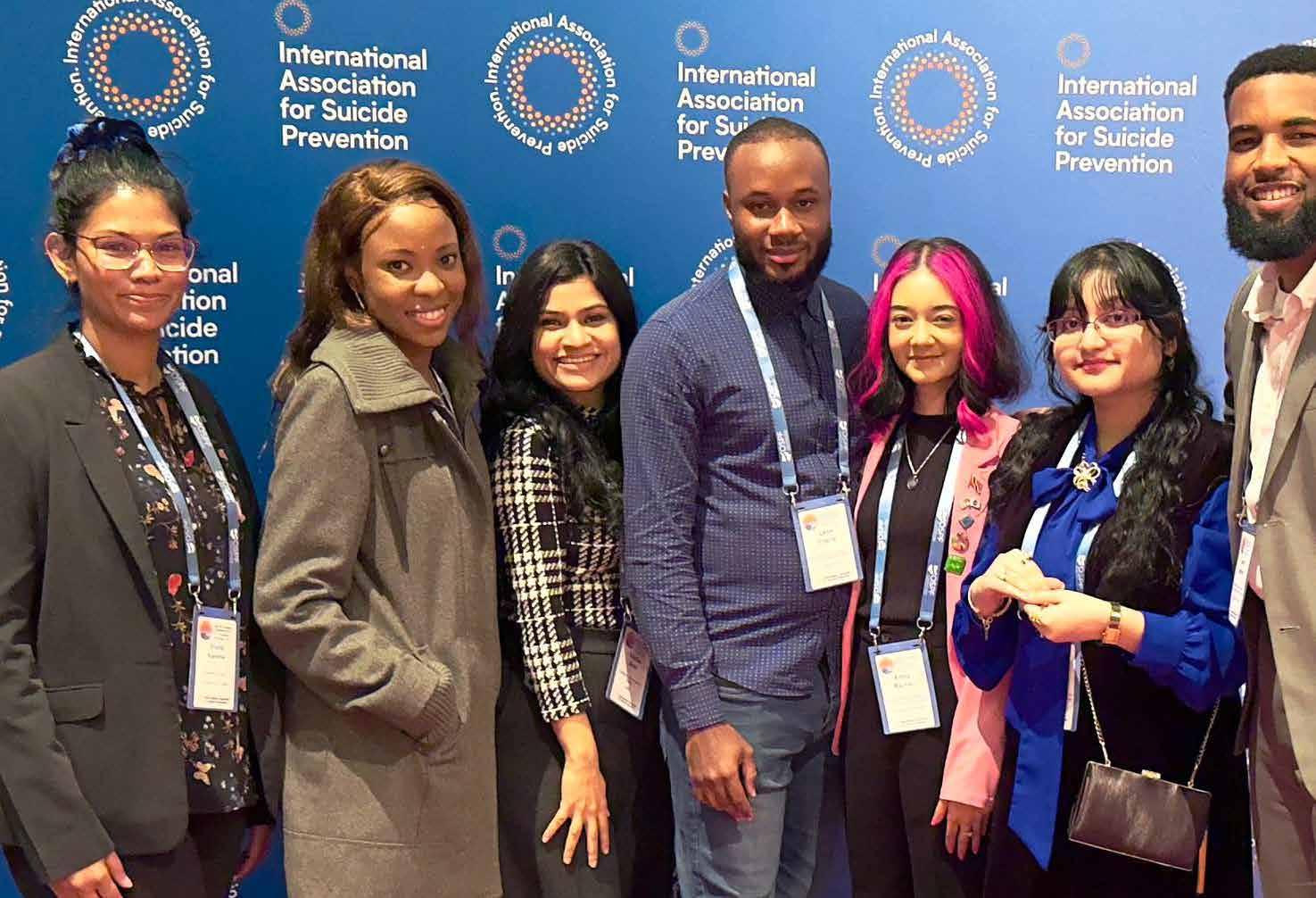

Leon Cherry, Co-Chair of the Caribbean Regional Coalition for the Decriminalisation of Suicide, St Lucia
UnitedGMH’s Aastha Sethi with members of the Caribbean Regional Coalition for Suicide Decriminalisation


PRIORITY 3:
INTEGRATING MENTAL AND PHYSICAL HEALTH SERVICES
Mental and physical health are not separate. People with mental health disorders are more at risk of physical health issues, and vice versa. For example, people living with HIV or TB may experience higher rates of depression and anxiety, which can reduce their treatment adherence, making their physical conditions worse.

We need a holistic approach to health. Integrating mental health into physical health services tackles disease and psychological problems simultaneously and in a more effective, supportive and cost-efficient way.
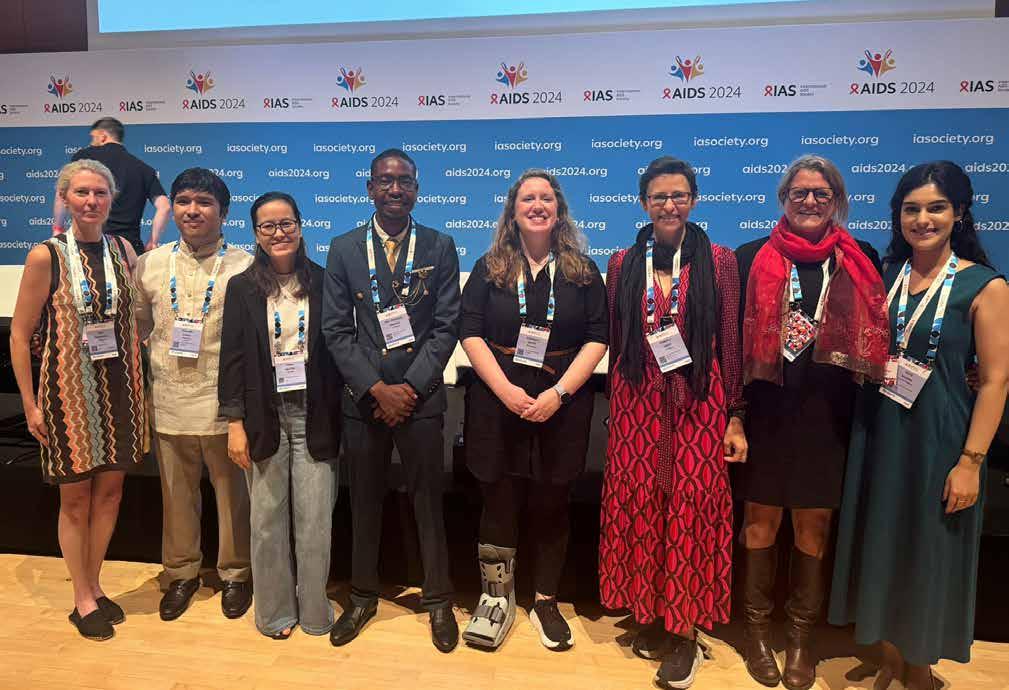
THE BIG NUMBERS: PHYSICAL AND MENTAL HEALTH

45.2% of those diagnosed with TB experience depression
Around 50-62% of people living with HIV experience mental health conditions, particularly depression
14 million cases of TB and nearly 1 million cases of HIV could be avoided by integrating mental health care into TB and HIV services, respectively.

People with mental health conditions are 2.5 times more likely to contract HIV
Donor Roundtable participants at AIDS 2024
Making mental health part of global health initiatives
In 2024, we continued to advocate for the integration of mental health and HIV/TB services.
We were a leading voice at key global events such as the International AIDS Conference 2024 and the Union World Conference on Lung Health 2024. We have also continued to play a pivotal role in facilitating information exchange as the convener and neutral facilitator for the informal Interagency Working Group (IAWG) on Mental Health Integration, which includes a range of UN agencies and bilateral donors.
We’ve built partnerships with regional coordinating bodies, especially in the Asia-
Pacific region – notably the Global Fund Advocates Network Asia Pacific, the Asia Pacific Council of Aids Organisations and the Seven Alliance – to help amplify the voices and efforts of national CSOs working with communities severely affected by HIV and TB.
In Pakistan, Ghana, Nigeria, South Africa and the Philippines – all countries with high disease burdens – we’ve helped partners to:
build strategic connections
raise awareness of the bidirectional relationship between mental health and HIV/TB
push for the integration of mental health into HIV and TB programmes, including by meaningfully engaging in Global Fund processes.
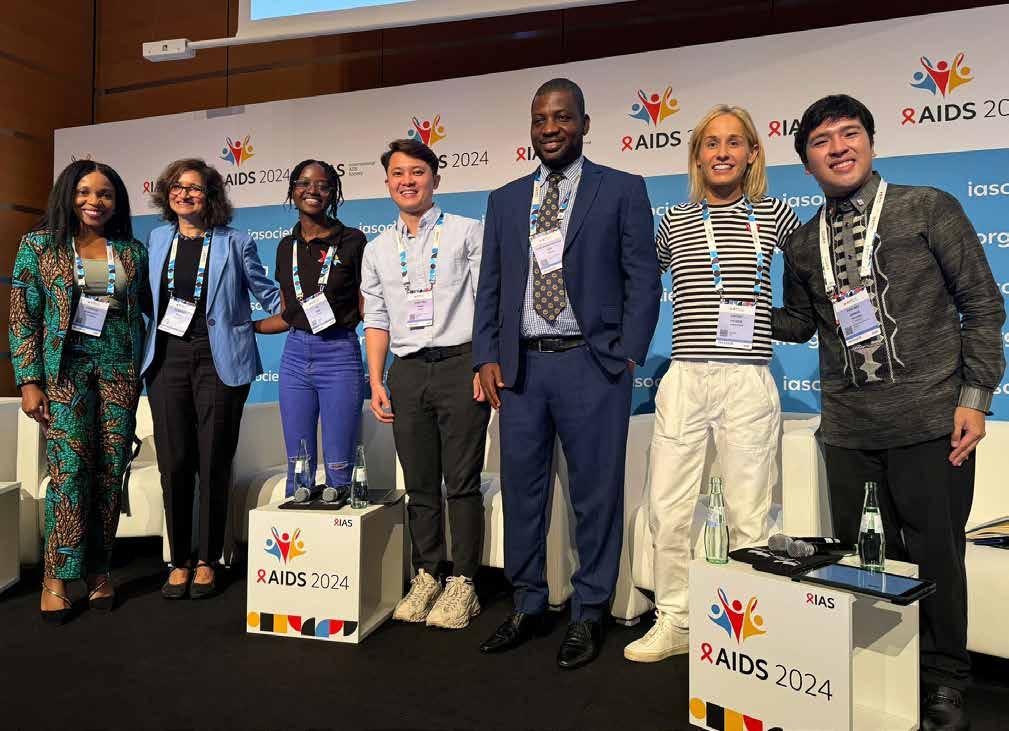
UnitedGMH advocacy at AIDS 2024
With the Elton John AIDS Foundation (EJAF) and the Global Fund, we co-hosted three events at the AIDS 2024 conference:
Alongside partners such as StrongMinds and SameSame Collective, we made possible key connections and thoughtful conversations between more than 700 participants at the conference’s first-ever mental health networking zone.
Our session, Investing in Minds Transforms Lives: A call for increased donor investment in mental health, HIV/AIDS, and TB, drew over 200 participants including representatives from the WHO, PEPFAR, the Global Fund, EJAF and UNICEF. The session identified what works and what is needed to attract more investment in mental health services for HIV- and TB-affected communities.
In total, more than 1,300 attendees directly engaged with us on mental health issues at AIDS 2024.
It was just one of the ways we built

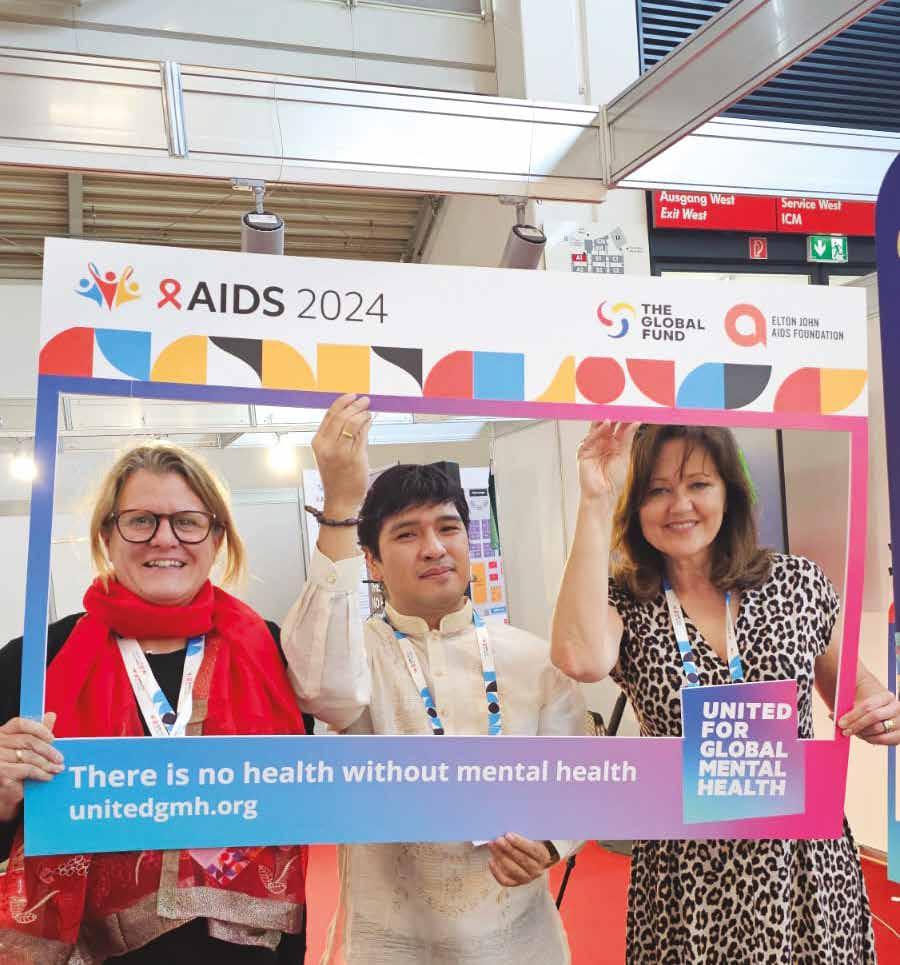

UnitedGMH staff and EJAF Global CEO Anne Aslett at AIDS 2024
Satellite Session participants at AIDS 2024

PRIORITY
4:
DRIVING MENTAL HEALTH UP THE POLITICAL AGENDA
In 2024, UnitedGMH took major steps in pushing mental health up the political agenda.
report revealing an estimated $200 billion

People with severe mental illness (schizophrenia, bipolar disorder or major depressive disorder) die up to 15 years prematurely due to other chronic conditions such as heart disease.
People living with diabetes are two or three times more likely to have depression than people without a diabetes diagnosis.
People living with coronary heart disease are 1.6 to 1.8 times more likely to have depression than people without a coronary heart disease diagnosis.
Individuals living with severe mental illness are 50% less likely to meet worldwide physical activity guidelines.
Increasing physical activity can help reduce the risk of heart disease and premature mortality in people with severe mental illness.
UnitedGMH played a core strategic role in organising the WHO-World Bank Financing Dialogue on NCDs and Mental Health

As the leading mental health CSO partner, we ensured the mental health community was fully represented and its priorities were heard in both the discussions and the preparatory documents. Through strategic advocacy, collaboration, and evidence-based recommendations, we drove meaningful progress toward integrating mental health into global health financing and policy frameworks.
Highlighting a US$200 billion gap
Launched to influence the WHO-World Bank Financing Dialogue, our new report, Increase, Improve and Integrate: The Way Forward for Financing NCDs and Mental Health, announced that, including only domestic financing, there is likely a gap in mental health financing of at least US$200 billion per year. Highincome countries are responsible for the vast majority of this shortfall.
Integrating mental health into climate and


UnitedGMH was instrumental in the organisation and delivery of the Fifth Mental Health Ministerial Summit, held in Argentina under the theme ‘Mental Health in All Policies’. The summit brought together government officials, CSOs, and experts from across Latin America and beyond to discuss innovative approaches to improving mental

“A failure to protect the environment is a commitment to violate human rights.”

A key achievement for UnitedGMH was successfully placing climate change and the environment on the summit’s agenda and securing an endorsement from the summit’s participants of recommendations for action. With support from The Wellcome Trust, we sponsored the participation of leading climate change experts. They led a workshop and engaged with attendees throughout the conference, highlighting the link between climate change and mental health.
The summit’s official recommendations included critical actions to make sure mental health is central to climate resilience and adaptation efforts. We are now building on this momentum to drive action addressing the intersection of mental health, climate and environmental challenges.


Pierre Cooke Jr, a mental health activist from Barbados with lived experience



As Dr Barbosa, PAHO’s Regional Director, emphasised in his closing remarks,
“Climate change is the biggest negative threat to health we have in this century. Mental health needs to be integrated into national adaptation plans.”



Advocating for a healthier mental health workforce
There is a worldwide shortage of mental health workers. It is most pronounced in Africa and the eastern Mediterranean, and especially in rural areas, where healthcare systems struggle to meet growing demand.
Alongside the Africa Centre for Disease Control, the International Council of Nurses, and the International Federation of Medical Students Associations, we launched a global campaign in 2024 calling for urgent action to increase the number of mental health workers worldwide and do more to support their mental health.
The campaign amplified the voices of frontline and future health professionals, shedding light on the unique challenges they face. It highlighted the need for systemic change, calling for investment in:
mental health training for health professionals
integrating mental health into primary health care
fostering a work culture where mental health is prioritised.
We discussed our call for action on the BBC’s Africa Daily podcast. It ultimately helped the campaign reach a global audience of about 364 million people across various platforms, pushing the issue higher up the agenda of health policymakers.
In 2025, supported by Flourishing Minds, we are taking the next steps in this work. We’re pushing for investment in the existing health workforce’s perinatal mental health skills to transform care for young mothers and their newborns.
THE BIG NUMBERS: MENTAL HEALTH WORKFORCE
12% of people with psychosis in low-income countries receive mental health care
Less than 30% of people with depression globally receive minimally adequate treatment.


3.8 mental health workers
per 100,000 people in LMICs
compared with 62.2 in high-income countries

PRIORITY 5:
ELEVATING YOUNG PEOPLE’S MENTAL HEALTH
The mental health of the younger generation is vital to the future health of our world. But rising numbers of young people are facing mental health issues – with consequences for their wellbeing, academic performance and prospects.

Nearly 1 in 5 adolescents experience mental health problems, often amid the challenges of making the transition to adulthood. Yet many do not have access to the support they need. That’s why, in 2024, UnitedGMH worked with partners including the Being Initiative to:
make young people’s mental health a higher priority
reduce gaps in access to care
improve school support systems
foster better social environments for young people.
We also made sure young people played a leading role in the conversation about their mental health, helping develop youth-centred policies.
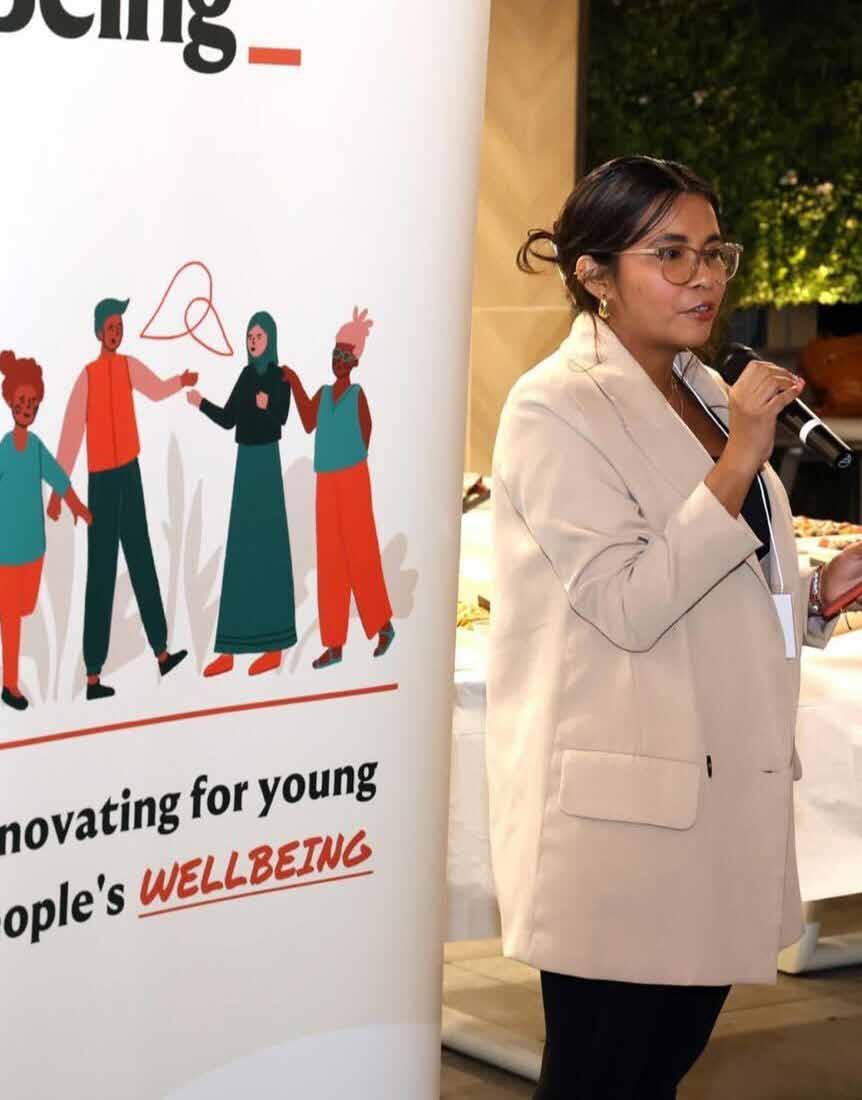
One young person in seven (aged 10-19)experiences a mental health condition
Half of all mental health conditions develop before the age of 14, and 75% by early adulthood
Depression, anxiety and behavioural disorders are the most common mental health challenges for young people
Untreated youth mental health issues contribute to a loss of $387.2 billion annually in global economic potential
THE BIG NUMBERS: YOUNG PEOPLE’S MENTAL HEALTH
Mental health youth advocate, Oriana Ortiz, at the UN General Assembly
Innovating for young people’s wellbeing
Being is an international mental health initiative with a vision of a world where young people feel well and thrive. Hosted by Grand Challenges Canada (part-funded by the government of Canada), this mental health initiative is a partnership between Fondation Botnar, the UK’s National Institute for Health and Care Research, the Science for Africa Foundation, Orygen, and UnitedGMH
We work with young people to improve their mental health and wellbeing through research, innovation and ecosystem building, with a focus on prevention and promotion in 12 priority countries: Colombia, Ecuador, Ghana, India, Indonesia, Morocco, Pakistan, Romania, Senegal, Sierra Leone, Tanzania and Vietnam.
Prioritising young people’s mental health
In 2024, UnitedGMH led the efforts of the Being Initiative to make sure young people with lived experience shaped global mental health conversations.
At the World Health Assembly, Summit of the Future, and UN General Assembly, we helped Being Youth Advisors advocate for youth mental health, environmental change and a larger role for youth-led organisations in systemic reform.
With our support, young people co-created the Lancet Psychiatry Commission on Youth Mental Health. It established key strategies and scalable models for prevention, promotion and service innovation in youth mental health care.
Through Being, we contributed to the mental health session at the Shape Africa Youth Summit hosted by the African Union and the World Economic Forum’s Global Shapers Community. Based on the #ICanSurvive Youth Mental Health Toolkit, co-developed with the African Union Youth Envoy, the session brought together more than 100 young leaders and government and civil society representatives to address the pressing mental health challenges African young people face.
By amplifying youth expertise and fostering collaboration, we make youth mental health a global priority – not just a conversation.
Tools for change
We launched a range of toolkits and reports in 2024 to help promote young people’s mental health:
Working with the AU Youth Envoy, we launched the Youth Mental Health Toolkit on 5 Emerging Issues in Africa in 2024. It provides policymakers, educators and healthcare professionals with practical, evidence-based, Africa-specific solutions for young people. The toolkit amplifies young people’s voices and lived experiences, promoting solutions grounded in real-life challenges. It aims to transform how mental health is understood and addressed, making mental health for Africa’s young people a clear priority.
As part of the WHO’s Partnership for Maternal Newborn and Child Health (PMNCH) Technical Expert Consultative Group, we helped develop the advocacy report Adolescents in a Changing World: The Case for Urgent Investment. The report shows that underinvesting in adolescent mental health leads to a higher adolescent burden of disease, increased substance use and higher school dropout rates. During its
launch at the 2024 World Health Assembly, we joined a panel of high-level delegates to highlight the importance of youth mental health.
As part of the Being Initiative, we launched Empowering Futures: The Role of Youth Mental Health in Advancing the Sustainable Development Goals during the 2024 UN General Assembly. Drawing on insights from Being’s analysis in 13 countries, the report outlines how investing in youth mental health can accelerate progress across various Sustainable Development Goals.
The South African President’s 2025 State of the Nation Address highlighted the National Strategy to Accelerate Action for Children, a policy UnitedGMH has proudly contributed to over the past year. It was part of our work to encourage the South African government to make youth mental health a 2025 G20 Presidency priority. UnitedGMH is a member of the South African Office of the Presidency’s Technical Expert Group on the Investment Case for Adolescent Wellbeing, working with the South African Presidency’s Adolescent Office, PMNCH, SRHR Africa Trust and the Being Initiative.
The Presidency’s Technical Expert Group on the Investment Case for Adolescent Wellbeing



PRIORITY 6:
BUILDING THE FIELD OF MENTAL HEALTH ADVOCACY
The world needs more mental health advocates driving action up the political agenda. That’s why UnitedGMH is developing the field of global mental health in our role as secretariat for the Global Mental Health Action Network (GMHAN), the world’s leading network for mental health advocacy. In 2024, GMHAN co-produced a new and comprehensive multi-year strategy, setting out a vision for a different global mental health future. And it delivered a wide range of activities to support its members.


3,510 members 5,589 members in 2024
Membership:
In 2024, the GMHAN membership grew by 59.2% from 3,510 to 5,589 members. Global representation:
Our network’s members now span 169 countries and territories – a 15% increase from the 147 countries in January 2024.

GMHAN: A peerless offer
There is no other network that can facilitate ‘global to local implementation’ and ‘local to global influence’ in global mental health at this scale. We see our advocacy-driven strategy as a way of inspiring significant action and change within the global mental health sector. What follows shows the range and quality of the networking and knowledgesharing opportunities GMHAN offers its


Global Mental Health Advocacy Forum 600 participants joined live, reflecting the event’s importance in fostering real-time dialogue, collaboration and extraordinary global engagement.
Featuring 54 speakers from 22 countries across five continents, the forum provided a truly global platform for sharing expertise, insight and innovative strategies to improve mental health outcomes worldwide.
Mental Health For All (MHForAll) webinars: Featuring 38 expert speakers and panellists from 18 countries across six continents, these webinars provided diverse, cross-sector insights into critical mental health issues. Our webinars on decolonising global mental health inspired cross-country connections and directly informed our strategy development.
1,504 registrations for...
“Being part of this forum reinforces my belief that collaborative efforts and shared knowledge are key to advancing mental health advocacy. Together, we can break the stigma and create a global space where mental health is recognised and supported for all.”


Mike Kirakossian from Lebanon

the Advocacy Forum ... from 135 countries and territories
GMHAN IN NUMBERS



“In 2023, I used to stay long hours on LinkedIn seeking people in the mental health profession and opportunities in the field, and it felt like there were not many. Fast forward to early 2024, I joined the GMHAN and boom! I live in an abundance of networks and opportunities now! I particularly appreciate the diversity of professionals and the very rich resources and opportunities shared almost daily. I even use the Advocacy Roadmap they provide to plan programmes for myself and my non-profit. When my colleagues compliment my professional development, I send them the ‘register to GMHAN’ link!”

7 webinars


3,113 registrations in more than 100 countries
1,373 attendees

Expanding collaboration through working groups: Our network now boasts nine active working groups, including two new ones focused on LGBTQ+ issues and stigma and discrimination. These groups are led by 26 dedicated co-chairs, representing 18 diverse countries and regions. They drive forward inclusive advocacy and peer learning on global mental health issues. Amplifying advocacy through GMHAN working groups: Our network’s working groups help increase the impact of mental health advocacy:
G20 policy brief: Thanks to GMHAN members’ advocacy efforts, a mental health pledge was included in the G20 Sustainable Financing document. Our was featured in the appendix of the official recommendations released by the G20 Working Group in June 2024 – a significant step toward global recognition of mental health within sustainable development frameworks.


Knowledge-exchange sessions: These six themed sessions offer participants opportunities for skill-building and professional growth on topics such as responsible reporting on mental health, pitching stories to the media, and effective social media strategies. With an average of 55 attendees per session, this series reflects our commitment to equipping partners and advocates with the skills to amplify global mental health narratives.
Empowering members with resources: To upskill and equip GMHAN members, we’ve developed and shared a range of impactful tools, including blogs (e.g. reflections of members returning from global events) and ‘Need2Know’ guides (on digital mental health and on air pollution and mental health), all accessible through our dedicated resource hub: GMHAN Resources.
New advocacy mechanism for children’s wellbeing: The commitment of GMHAN members saw the launch of a groundbreaking initiative: Children in the G20. This new civil society platform worked throughout 2024 to ensure children’s mental health and wellbeing gain more prominence in future G20 highlevel meetings, providing a vital advocacy channel for a historically underrepresented demographic.
Youth engagement in New Zealand: The Public Health Association of New Zealand used the Child and Youth Working Group’s Effective Youth Engagement Guidelines to inform its briefing on developing youth-centred policy through innovative practices. These guidelines were also used in its work to influence ministerial policy, which has the potential to positively impact the wellbeing of the country’s 1.6 million young people.
Together, these initiatives highlight the power of collective action and knowledge sharing in advancing global mental health advocacy.
“I joined the Global Mental Health Action Network to learn about global initiatives and to identify strategies that we could adopt and share from this platform. I am very excited about the tools and the collective actions that members will share to advance the implementation of anti-stigma initiatives worldwide.”

Judy Kariuki, Co-Chair of our Stigma and Discrimination Working Group


Chinyere Okoro, Nigeria

2025: increasing momentum

We can’t let the momentum we’ve built on mental health in 2024 go to waste. We’ll push forward on the big issues in new ways in 2025.
Suicide decriminalisation: work of national partners, we’ll push for suicide to be decriminalised in five more countries, benefitting approximately 4,220 people annually and paving the way for decriminalisation across the Americas.
Moving away from institutions: join with partners and donors to call for urgent improvements to the conditions of millions of people living in mental health institutions, where they’re often isolated, abused and stripped of their rights. We’ll advocate for rights-based reforms and a focus on community-based care.
Integrating mental health into health systems: We’ll work with our partners to advocate for mental health to be prioritised in the Global Fund’s 8th replenishment and other global health frameworks. We want to ensure that mental health is an integral component of national policies and plans for primary health care, and disease-specific strategies.
Mental health community mobilisation: September’s Fourth High-Level Meeting of the UNGA on NCDs and Mental Health is a critical opportunity to advance the mental health agenda. UnitedGMH and GMHAN will make sure the meeting is informed by the voices of local mental health advocates and civil society from across the world, helping create momentum the HLM decisionmakers cannot ignore.
A mental health workforce fit for purpose: We’ll keep working to address the global shortage of mental health workers. With the support of the Flourishing Minds Fund, this work will focus on pushing for increased investment in increasing the existing health workforce’s perinatal mental health skills to transform care for young mothers and their newborns.
Climate change and mental health: With support from the Wellcome Trust, we will continue advocating for the integration of mental health into national and global climate change policies and plans. For example, using the WHO Second Conference on Air Pollution and Health to push for mental health to be included in global discussions on the environment.

Youth policies: As partners in the Being Initiative, we will work to secure greater investment in young people’s mental health globally and empower young people to champion youth mental health services. We will also advocate for youthfriendly, accessible and culturally relevant mental health services across the 13 Being Initiative priority countries.


•
•
•
•



